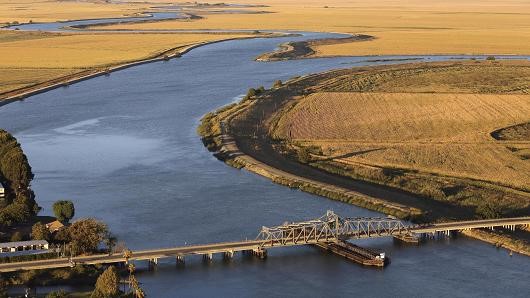In parched Central California, water trumps other election issues
Even with the presidential race tightening, one issue in a drought-parched region of California has remained constant — water and the lack of it.
“Water right now is the number one issue for us in the Central Valley,” said Republican Rep. David Valadao, whose congressional district includes some of the state’s largest agricultural production but has been hit hard by the 5-year-old drought.
The drought impact goes beyond agriculture in the San Joaquin Valley. Water tables in rural communities in parts of Fresno, Tulare, Kings and Kern counties have dropped and residential wells are running dry. Compounding the problem, the concentration of contaminants in the water is rising in some areas.
“We do believe it was a man-made drought,” said Valadao. He contends federal and state government agencies are unfairly reducing water supplies to farmers and residents and are instead trying to protect fish such as the Delta smelt.
San Joaquin River in California- Robert Galbraith | Reuters
Valadao is facing a tough re-election fight in a congressional district where more than a quarter of the families are below the poverty level.
His Democratic challenger, Bakersfield attorney Emilio Huerta, concedes water is the top priority even as he tries to taint Valadao by linking him to GOP presidential candidate Donald Trump.
“There is no drought,” Trump declared in May at a rally in Fresno.
Counters Huerta, “There is very much a drought in California, and it’s been going on for approximately five years. It doesn’t look like there’s an end in sight.”
Moreover, Huerta said there’s “a fear of cancer clusters and people being exposed to dangerous toxins” in the water supply.
Yet it’s the “farmer-versus-fish” conflict that draws the biggest reaction.
In May, Trump played up the water politics when talking about the lack of water pumped to local farmers and used the Delta smelt fish as a villain.
“They’re trying to protect a certain 3-inch fish,” he said, which prompted friendly boos from a crowd that included numerous people holding placards “Farmers for Trump.”
“He’s not the first person to politicize this,” said David M. Kennedy, a Stanford University professor emeritus and Pulitzer Prize-winning American historian.
Blaming ‘liberal environmentalists’
Last year, then-presidential hopeful Carly Fiorina weighed in on the water issue and termed it “a man-made disaster” and pinned the blame on “liberal environmentalists.”
“This is sloganeering,” said Jeffrey Mount, a senior fellow at the Public Policy Institute of California’s Water Policy Center. “In fact, the environmental allocation during the drought has been tiny. The environment takes a bigger cut than everyone else.”
Valadao has tried to distance himself from Trump. The Republican lawmaker, who was first elected to Congress in 2012 with nearly 58 percent of the vote, represents a district where more than 70 percent of the residents are Latinos.
“I’ve not gotten involved in that Trump campaign at all,” said Valadao, who comes from a dairy farming family and is the son of Portuguese immigrants.
Huerta was endorsed on Friday by President Barack Obama. The congressional candidate is the son of Delores Huerta, a labor and civil rights leader who co-founded what later became the United Farm Workers.
Indeed, the Democratic Party is hoping to pick up House gains in Tuesday’s general election and believes Valadao’s seat may be more vulnerable this year.
“Donald Trump is the leader of the Republican Party and he (Valadao) failed to distance himself from Trump early on,” said Huerta, who went on to criticize Trump for making negative remarks about Mexican immigrants.
Meantime, Valadao last year introduced a House bill (HR 2898) that would have eased the environmental rules. The bill passed the Republican-controlled House but hasn’t been approved by the Senate, where Barbara Boxer and Dianne Feinstein — the two Democratic senators from California — oppose it. Prior to that, Valadao had a 2014 water bill that cleared the House but didn’t pass the Senate.
“His bill hasn’t gotten anywhere,” said Huerta. “It failed to get approval from the Senate so now he’s blaming the California senators. Whereas two years ago he was blaming the Democratically elected Senate.”
No quick fix for drought in Congress
Feinstein proposed her own drought fix earlier this year but it also hasn’t passed Congress.
“It’s hard to believe the water issue would play for the Democrats because their track record isn’t so great — at least from the central farmer point of view,” said Joel Kotkin, a presidential fellow at Chapman University in Orange, California.
Valadao said several of California’s largest reservoirs are so full that water agencies released the overflow into the ocean rather than pump it to the state and federal water projects where it could eventually be used for water supplies.
Environmentalists contend pumping water via the Sacramento-San Joaquin River Delta to farmers is damaging to salmon and Delta smelt. The state estimates around two-thirds of all Californians and millions of acres of irrigated farmland rely on the delta for water.
“If you look at the salmon, they are dwindling,” said Adam Scow, the California director of Food & Water Watch, a Washington-based advocacy group. “His (Valadao’s) solution (is) to just gut the nation’s environmental law in order to be able to take more water.”
Scow sees the problem as somewhat self-inflicted due to what he calls “over planting” of nut trees and other crops as well as the “over pumping” of groundwater.
“California cannot sustain this type of production with this mantra that we need to dominate all agricultural markets,” he said. “We’re losing our water with that mindset.”


